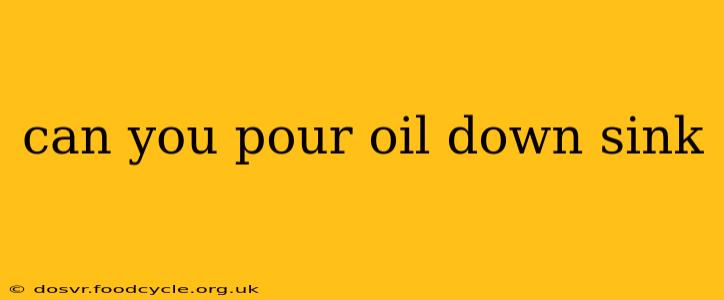Can You Pour Oil Down the Sink? A Definitive Guide to Grease Disposal
Pouring oil down the sink might seem like a convenient way to dispose of leftover cooking oil, but it's a decision that can lead to serious plumbing problems down the line. The short answer is: no, you absolutely should not pour oil down the sink. Let's explore why this is such a bad idea and what the better alternatives are.
What Happens When You Pour Oil Down the Sink?
When cooking oil, grease, or fat cools, it solidifies. This solidified grease clings to the inside of your pipes, gradually building up and creating a thick, sticky layer. Over time, this buildup restricts water flow, leading to:
- Clogged drains: This is the most common immediate consequence. You'll experience slow draining sinks and potentially complete blockage, requiring costly plumbing repairs.
- Sewer backups: The solidified grease can eventually clog your main sewer line, resulting in a messy and smelly backup of wastewater into your home.
- Expensive plumbing repairs: Clearing a grease-clogged drain often involves using harsh chemicals or calling a plumber, incurring significant expenses. Preventative measures are far cheaper.
Why is Grease So Problematic for Pipes?
Grease is a hydrophobic substance, meaning it repels water. This means it doesn't mix with the wastewater flowing through your pipes, instead accumulating and creating the problems mentioned above. Even small amounts of oil, consistently poured down the drain, can accumulate over time and cause major issues.
What are the Best Ways to Dispose of Cooking Oil?
Fortunately, there are several safe and effective ways to dispose of cooking oil without harming your plumbing system:
-
Cool and pour into a sealable container: Let the oil cool completely before pouring it into a sealable container (like an empty jar or can). Once full, securely seal the container and dispose of it in your household trash.
-
Reuse the oil (if appropriate): Some cooking oils, especially those with high smoke points, can be reused several times. Strain the oil through a fine-mesh sieve to remove food particles before storing it in a sealed container in a cool, dark place.
-
Recycle cooking oil: Many communities have programs for recycling cooking oil. Check with your local waste management department or search online for "cooking oil recycling near me" to find a convenient drop-off location.
Can I Use Drain Cleaners to Remove Grease Buildup?
While drain cleaners can sometimes temporarily clear a clogged drain, they are not a solution for grease buildup. These chemicals are harsh, can damage your pipes over time, and are not environmentally friendly. They often don't completely remove the grease, simply pushing it further down the line, potentially exacerbating the problem later. Prevention is always better than cure!
How Can I Prevent Future Grease Buildup?
-
Regularly clean your drains: Use hot water and baking soda to periodically flush your drains and help prevent grease from sticking.
-
Install a grease trap: For commercial kitchens or homes with significant grease production, a grease trap can effectively separate grease from wastewater before it enters the sewer system.
By following these simple steps, you can protect your plumbing system, save money on repairs, and contribute to a healthier environment. Remember, disposing of cooking oil properly is essential for maintaining a smoothly functioning home plumbing system.
